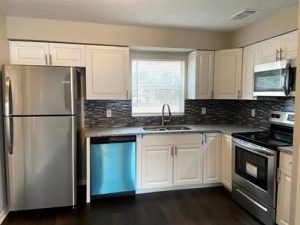
Taylor Brugna is an out of state investor and one of my oldest clients. We originally connected via Bigger Pockets, and I helped him acquire his first rental (a $30k condo) in the Tampa Bay area in 2015.
Recently, we were discussing his portfolio and I asked how many doors he was up to, and Taylor replied 102!
Even though I helped with every acquisition as his real estate broker and now manage them all as his property manager, that number still surprised me and struck me as an impressive feat: From 1 to 100 doors in little over 5 years!
So Taylor and I decided to do some reminiscing and put together this interview discussing our shared journey to 100 doors: We figured there had to be some lessons learned, tips, and pitfalls to share that might prove useful to other real estate investors. So, without further adieu:
JC: Wow! 100 doors in 5 years! Even though I was involved at every step, I’m still impressed. Was 100 doors a specific goal of yours? Or did it just sort of happen? (and do you have goals beyond 100? Where do we go from here?)
TB: If you would have told me 5 years ago that we’d be at 100 units, I would have said that you were crazy! The original plan was to generate some passive income to supplement my entry level job as a CPA out of college. As somebody who has always been an entrepreneur, it gives me great satisfaction to add value to something and to make it better. Once we were at about 25 units, I realized it could be a viable business, and that scale would only help us going forward. My goal is to create a very efficient system that can handle hundreds of units while continuing to not need to syndicate anything. While 100 units is good scale, I think there are more efficiencies to be had in the 300-500 unit range. I’d like to do this by 2030, barring any adverse market conditions.
JC: On a related note, earlier I mentioned you were one of my “oldest” clients. But I didn’t mean your age! You are relatively young. What advice would you give the aspiring 20 or 30 year-old investor who is just starting out?
TB: This question made me laugh, because I always wondered if you actually knew how old I was at the time! We started at 21, and I’m currently 27 years old, although I feel like I’m much older.. I’m glad you took us seriously and didn’t discount our ability to get things done. My advice for younger investors who are just starting out:
- Show your seriousness about jumping in by coming into new relationships prepared. Nobody is expecting you to be an expert, but it’s pretty easy to gauge your level of interest and your willingness to learn by the questions that you ask.
- Avoid Analysis Paralysis – Modeling out future returns is crucial to your success but I have seen many new investors get stuck at this step. At some point, you have to jump in and get started! There’s no better education than actually buying your first investment property. [Side Note: We have the cure for analysis paralysis right here on our website!]
- Treat your team (PM, Brokers, Contractors, CPAs, Attorneys, Title, etc.) well and like partners – These team members are absolutely crucial to your success, and you’ll quickly find that real estate is a team sport. I’ve found that my team will produce better quality work if you respect their time, don’t micromanage, and are easy to work with.
JC: Out of 100 units, there must be a property or two that you’d consider a “dud” – Are there any you wish you hadn’t bought, or wish you’d handled differently?
TB: To be honest, there isn’t a single property I wouldn’t have bought again a second time (the 8-unit you’re thinking about is in a great area and will be worth the headache in 10 years!) However, I have learned many lessons along the way. For example, I learned that rougher areas look better on paper, but 90% of the time they wind up underperforming a higher quality asset. I learned that partnerships are long term commitments and need to be structured carefully, and that wood frame structures have much higher maintenance costs!
JC: At the other end of the spectrum: Tell our readers about the homeruns…Which one do you consider the sweetheart deals that you still can’t believe you landed?

TB: One would be an 8 unit apartment building in Tampa that we gut renovated and did higher end renovations. Even after renovation costs, the property has doubled in value! The new university mall has a lot to do with this, but the quality of renovations really helped raise rents. Gut renovations also lead to low maintenance, profitable rentals for years to come.
My real favorite (because it caused the most pain) is a 6 unit, wood frame building built in 1925 that we took down to the studs, and spent hundreds of thousands of dollars (and over a year!) updating to a high end property. It leased up very quickly, and is in an area with true upside. The final touches are being done as we speak, and I’m so glad to see it finally done!

JC: And what about the ones that got away? You and I must have analyzed thousands of properties in the past five years, and obviously passed on most of them. Are there any you look back on and wish you’d pulled the trigger on at the time?
TB: There’s too many to list, but unfortunately real estate is a capital intensive business and I would prefer to keep majority ownership as opposed to syndicating deals out. In late 2018-early 2019, there were a few larger multifamilies that we almost landed (15+units) that seemed pricey at the time so we decided to deploy capital into smaller units instead. Specifically, a 18 unit in St. Petersburg on 3rd St N and 16 units right next to 8 units that we already own in Tampa. I think getting a few of those larger buildings would have taken the business to another level. I try not to get too emotional about the properties, but it’s challenging.
JC: Speaking of underwriting properties. Does your experience as a CPA give you superpowers in that regard? Generally speaking, I’d say you haven’t been particularly aggressive in terms of making lowball offers, beating down sellers on price, or re-trading after inspections. One might say you’ve picked up a ton of solid base hits, rather than chasing a home run. Would you say that’s accurate? And do you still think that’s a viable strategy?
TB: That’s correct. I love how flexible real estate is, and how you can tweak the business model to make it work for you. I am very fortunate that my wife and I have stable, well paying careers and we don’t require home runs to support our investment and financial goals. While I mentioned two large renovation projects as my two favorite deals, most of our properties are plug and play, and we add value by managing them better. I specifically choose this model over time intensive projects because our time is better spent focusing on our careers at the moment. It’s a viable strategy in today’s market, especially with how volatile alternative investment options like the stock market have been. Personally, if I can get 8% cash on cash in a tax efficient way, I am thrilled. The reality is that rental real estate is a slow way to get rich, but over time, your wealth starts to snowball if you keep saving and reinvesting your passive income.
JC: I know a question on the mind of a lot of my readers is “How did you finance all these deals?”. You’re a CPA, so I assume you make decent money. But you’re still working a relatively normal W-2 job and (as far as I know) you didn’t start this journey being independently wealthy or with a pile of inherited cash to spend. From my perspective, you’re a working class mortal like the rest of us; You cautiously analyzed every deal, built relationships with lenders and investing partners, and for lack of a better term, did it the hard way. There are a lot of people trying to duplicate your success. What advice would you give them about financing rental properties, and managing their personal finances in general?
TB: My wife and I started with exactly $1000 in high school and started a business selling clothes from outlet stores on eBay. It was a grind during college while we were trying to keep our grades up and enjoy the experience, but we were thankful that we did it when it was time to enter the workforce and we had some capital to invest. From there, it was a really simple strategy for us. This may not work for everyone, but here’s what we did:
- The importance of your career trajectory will be far more important than the first 1 or 2 rentals purchased. Focus on increasing income as much as possible in the early years of your career.
- Max out both 401ks in boring index funds as a way to diversify and defer tax and invest the remaining savings in real estate.
- Save every penny of passive income when possible and reinvest it. To this day, I’m not sure if we have ever spent a dollar of our passive income. We’re building a primary residence soon, and I think that will be the first time!
- Take advantage of conventional financing up to the 10 loan limit, or until your DTI allows.
- Always refinance when the math makes sense. It’s hard work, but interest is my single largest expense.
- After that, build relationships with local banks and portfolio lenders who are more flexible and can allow you scale at a more rapid pace.
- Keep leverage at a reasonable level. For me, it’s 65% LTV.
JC: Inventory (which is down something like 50% year over year) is a big buzzword right now. And I know a lot of readers are also wondering where you found all of these deals? Looking back, I’d say maybe half of them I found and pitched to you, and the other half you found and pitched to me. And I’d also say that probably 80% or more were “on market”, meaning they were being advertised in the MLS or via other big national platforms like Loopnet or CREXi. This brings up a couple of questions I’d love to hear your perspective on…
The first is your relationship with your real estate broker/agent. As far as I know, you don’t view me as your “deal finder”, but more of a resource to be leveraged after somebody finds or presents a possible deal. I actually think too many investors get that backwards and make the mistake of reaching out to brokers or realtors and saying “I have money and want to buy, send me all your best deals”, which rarely works. I don’t have a “secret stash” of off market deals. Rather, I add value by helping buyers analyze, negotiate, and ultimately, acquire and manage rental properties. You’ve obviously been successful on this front, so How do you view the role of your real estate broker/agent in acquiring new properties?
TB: While I would love to have a funnel of off-market deals, as you mentioned, these deals have been few and far between. To me, a broker is a second set of eyes and ears on the ground, a consultant, and a trusted friend that I expect to have my best interests in mind with negotiating, looking out for any issues during due diligence, and giving their honest opinion about the investment. Over time, you have learned my preferences and we can work through potential properties very quickly.
JC: What advice would you give to aspiring investors who just can’t find anything to buy right now? And (in rough numbers) for every property you bought, how many did you analyze and pass on?
TB: Be patient and save your funds for the right opportunity! When I first started, I would set goals and get really excited about the unit count. Over time, I realized that positive cash flow is a much important metric than the number of units. I probably close on somewhere between 1-5% of the properties I analyze.
JC: Looking back, on the one hand, you’ve been fortunate to have caught an upswing in the real estate market from 2015 to 2020, where appreciation was just sort of there for the taking. But on the other hand, you and I have discussed many times how we would welcome a downturn in real estate prices so we could actually find some better-priced deals, and we have yet to see that. What are your thoughts on market cycles, market timing, when to buy, and when to hold off? Is there a bad time to buy real estate?
TB: I think it really depends on your long term strategy. My strategy is to have this portfolio for retirement income, so I plan on holding every property I buy for at least 25-30 years(when the depreciation schedule runs out). In this situation, I don’t think there is a bad time to buy if the numbers work, and manage leverage accordingly. I’m really optimistic about the Tampa Bay market and am glad to have found an area with strong rental demand and population growth.
JC: The COVID 19 situation has accelerated some trends we were already seeing in the Tampa Bay market: Tenants are flocking here from New York, New Jersey, DC, and Chicago (if you can work from home, you don’t need to pay for an apartment in Manhattan, or shovel snow in Chicago) and real estate investors are following suit to some degree as they flee less landlord-friendly states like New York and California. This (along with record-low interest rates) is obviously driving up demand, and thus prices, and compressing cap rates. Where do you see the Tampa Bay real estate market in 5/10/20 years? Are the 1% rule and other common metrics still going to be valid?
TB: The Tampa Bay market has been one of the fastest growing and best performing markets for years at this point, and it’s showing no signs of slowing down. I don’t think we’re going to see 1% deals much longer (there are hardly any now!) and I think that we are slowly going to start to see the market look more like a major city. It’s ranked at the top for population growth, job growth, migration, etc. I think investors will have to get more creative in the next decade and start looking more towards heavy value-add deals, development, adding units to existing structures, and maybe even short term rentals. Mobile home park investing has exploded also!
________________________________________________________________________
Taylor is a Certified Public Accountant and holds a Bachelors in Accounting & Finance from Binghamton University. Learn more about Taylor’s journey on The Real Estate CPA Podcast, or connect with him on Bigger Pockets.

